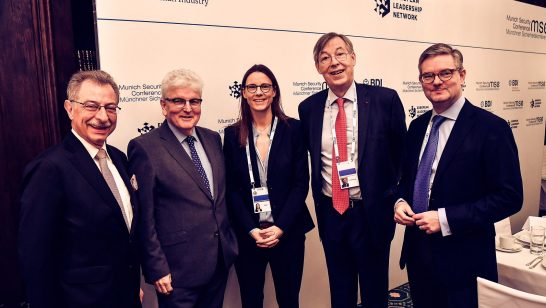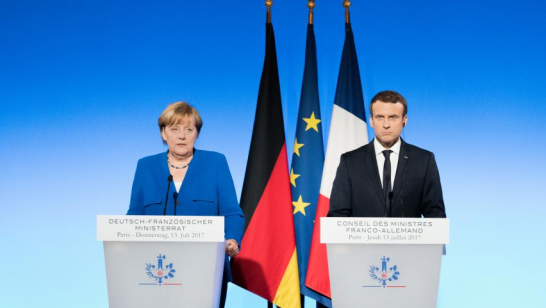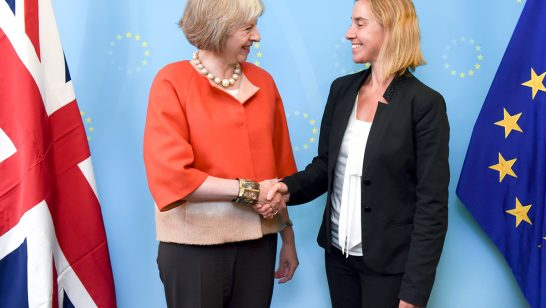
On 17 February 2018 at the Munich Security Conference, the European Leadership Network (ELN) and the Federation of German Industries (BDI) hosted a high-level closed roundtable breakfast under the co-chairmanship of BDI President Prof. Dieter Kempf and ELN Chairman Lord Browne. Both organisations are grateful for the outstanding quality of the speakers and participants and for their many excellent contributions.
Participants came mainly from Germany, France, the United Kingdom, the EU institutions, NATO and European defence industry. The meeting considered the state of Franco-German defence collaboration and industrial cooperation, its impact on the rest of Europe, the relevance of the recent EU defence package, and future prospects.
Opening remarks were given by Sir Julian King, EU Commissioner for the Security Union; Dr Katrin Suder, State Secretary, German Federal Ministry of Defence; and Prof. François Heisbourg, Chairman of IISS and the Geneva Center for Security Policy.
The following account prepared by ELN Policy Fellow Alice Billon-Galland does not necessarily represent the views of the ELN, the BDI or the participants.
The event was held under Chatham House rule.
Main messages
- On present form, there is less to the Franco-German motor than meets the eye. It has neither momentum nor clear direction.
- Most participants doubted whether existing and new EU tools will deliver significant additional defence capability and operational results.
- There was general support for greater intergovernmental clarity and direction in steering and supporting European defence business and more intra-European defence industrial consolidation.
- The lack of a common European strategic culture was at the heart of the debate and is at the heart of the problem. France’s proposed European Intervention Initiative is unlikely to make much difference to strategic culture and could risk further fragmentation of European defence arrangements.
- Somewhat more emphasis was placed on bringing together France’s operational approach, Germany’s defence, diplomacy and development framework and continued UK engagement with European institutions after Brexit.
The need for political direction
The ambition of the four armaments principles in the German White paper was highlighted: common design; a lead nation; identification in each case of a lead industry; and a comprehensive approach. But participants called for political clarification and support on intra-European procurement projects, arms exports legislation, and international industrial competition. Most welcomed recent EU initiatives and underscored the need for Europeans to deal jointly with the present security context. But many doubted the capacity of EU tools to deliver increased capabilities and operational results.
The case for more European defence industrial consolidation
The EU27 still make up the second largest defence budget in the world after the United States, and Europe saw the greatest absolute increase in defence spending in 2017. But the roundtable noted that over the last few years European defence spending has neither kept up with the evolution of threats nor with transatlantic uncertainty. All deplored the fragmented nature of the European capability landscape and European “bunkerisation” and split budgets.
Participants agreed that common procurement projects, such as the Eurodrone (which will gather four member states under one common design and German leadership), demanded a strengthening of European defence industry. Views were divided over whether Franco-German industrial consolidation would happen by competition or by top-down political decision, and where that would leave the rest of European defence industry. The issue of Chinese and US technological domination and industrial competition was also tackled: did Europe really have the ambition to be part of international industrial competition or not? The roundtable seemed to agree that Europe should not open its markets entirely to either Chinese or US competition – with one participant suggesting the creation of an EU committee to protect European defence technology on the lines of its US equivalent.
On arms exports, the majority of participants lamented the lack of a Franco-German intergovernmental defence cooperation agreement to regulate the arms trade – like the 1972 Schmidt-Debré agreement – whose absence destabilizes possible mergers between French and German companies and limits exports. Although the German government’s position on this issue is a firm case-by-case-basis rule, many around the table called for a new legal framework. A Schmidt-Debré 2.0 agreement would enable the German government to keep its own standards on exports without jeopardizing industrial partnerships with its European neighbours. Opinions differed over whether a market limited to EU, NATO, and partner countries would be large enough for German defence companies to survive.
The prospects for EU defence harmonisation
Concerning recent EU defence initiatives, most felt that the European Defence Fund (EDF) was the best tool to encourage the industries and militaries of the EU26 to work together towards more common specifications. Most argued that an ambitious and well-funded EDF was a more efficient tool than the EU’s Permanent Structured Cooperation (PESCO). Many doubted that PESCO’s 25 member-wide “avant-garde” could produce significant results in terms of either capabilities or deployments. But views still differed over the true value of PESCO and the EDF, with one participant insisting trenchantly that EU initiatives should be capability-driven and not industry-driven.
The roundtable seemed to agree that Brexit should not impede strong industrial cooperation with the United Kingdom in the future – for instance concerning the Franco-German development of the Eurofighter. Participants recognized that a trilateral discussion between the UK, Germany and France on industrial issues would be valuable, and that the UK could become an EDF partner country post-Brexit.
A fragmented European Strategic Culture
Discussion moved on to other strategic challenges facing European defence cooperation. The majority in the room agreed that Europe needs to go beyond procurement and should develop a comprehensive approach to cooperation in the fields of training, maintenance and logistics.
The lack of a common European strategic culture was at the heart of the debate. Many felt that the differing rules of engagement of each country are very problematic for joint operations. The French proposal for a European Intervention Initiative (EII) was met with skepticism by many in the room and was also seen as potentially threatening further fragmentation of the European defence framework. Although the strategic gap is unlikely to ever be filled, more Franco-German convergence could be achieved by bringing together the French operational approach with Germany’s 3D framework (Defence, Diplomacy, Development). Nevertheless, the roundtable appeared equally skeptical about the ability of the Franco-German tandem to provide a joint approach to operations in the near future.
The opinions articulated above represent the views of the author(s), and do not necessarily reflect the position of the European Leadership Network or any of its members. The ELN’s aim is to encourage debates that will help develop Europe’s capacity to address the pressing foreign, defence, and security challenges of our time.



